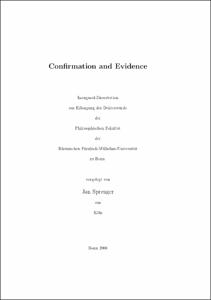Online-Ausgabe in bonndoc: https://nbn-resolving.org/urn:nbn:de:hbz:5-15062
urn: https://nbn-resolving.org/urn:nbn:de:hbz:5-15062,
author = {{Jan Sprenger}},
title = {Confirmation and Evidence},
school = {Rheinische Friedrich-Wilhelms-Universität Bonn},
year = 2008,
note = {
The question how experience acts on our beliefs and how beliefs are changed in the light of experience is one of the oldest and most controversial questions in philosophy in general and epistemology in particular. Philosophy of science has replaced this question by the more specific enquiry how results of experiments act on scientific hypotheses and theories. Why do we maintain some theories while discarding others? Two general questions emerge: First, what is our reason to accept the justifying power of experience and more specifically, scientific experiments? Second, how can the relationship between theory and evidence be described and under which circumstances is a scientific theory confirmed by a piece of evidence? The book focuses on the second question, on explicating the relationship between theory and evidence and capturing the structure of a valid inductive argument. Special attention is paid to statistical applications that are prevalent in modern empirical science.
After an introductory chapter about the link between confirmation and induction, the project starts with discussing qualitative accounts of confirmation in first-order predicate logic. Two major approaches, the Hempelian satisfaction criterion and the hypothetico-deductivist tradition, are contrasted to each other. This is subsequently extended to an account of the confirmation of entire theories as opposed to the confirmation of single hypothesis. Then the quantative Bayesian account of confirmation is explained and discussed on the basis of a theory of rational degrees of belief. After that, I present the various schools of statistical inference and explain the foundations of these competing schemes. Finally, I argue for a specific concept of statistical evidence, summarize the results, and sketch some open questions.
url = {https://hdl.handle.net/20.500.11811/3287}
}






